
Most Common Summer Pests
Last updated on June 20th, 2025 at 03:06 pm
As the temperature rises and the days grow longer, these most common summer pests bring with them a myriad of joys, from beach trips to barbecues. However, along with the sunshine and warm breezes, summer pests also herald the return of some less welcome visitors: pests. From ants marching across your kitchen counter to mosquitoes buzzing around your backyard, summer pests can quickly turn a relaxing day into a frustrating battle. But fear not! With the right knowledge and preventative measures, you can keep your home pest-free all summer long.
Summer Pests: Rats (Stealthy Intruders)
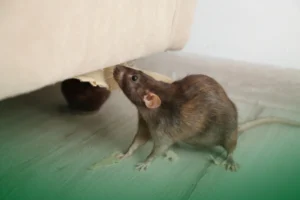
Rats are a year-round nuisance, the most common summer pests, since they tend to be most active during the warmer months. Not only are they unwelcome guests due to their unsightly presence and signs, but they also pose intense damages and serious health risks. Rats can transmit diseases through their bites, feces, and urine, making them a threat to both humans and pets. To keep these rodents at bay, inspect your home for any potential entry points and seal them off to protect the structural integrity of your property. Additionally, store food in properly and keep garbage cans covered to eliminate potential food sources and avoid food poisoning.
Book our Rat Control.
Summer Pests: Carpenter Ants (Wood-Destroying Pests)
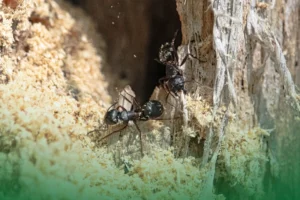
Carpenter ants may not eat wood, but they can cause significant damage by excavating it to create nests. These pests become more active as temperatures rise, so it’s essential to be vigilant. Look for signs of carpenter ants, such as rustling sounds in the walls or piles of wood shavings, and take steps to eliminate them. Store food properly and keep your living space clean to deter these unwelcome guests from making themselves at home.
Book our Ant Control.
Summer Pests: Mosquitoes (The Itchy Menace)
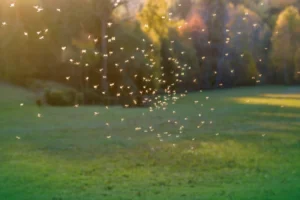
Few things can ruin a common summer evening faster than the persistent buzzing of mosquitoes. Not only are their bites itchy and irritating, but they can also transmit serious diseases such as Dengue, Malaria, and West Nile Virus. Protect yourself and your family by wearing protective clothing like long sleeves and pants when outdoors, and use insect repellents containing DEET or picaridin. Remove standing water near your house to eliminate breeding grounds, and ensure that windows and doors are properly screened to keep mosquitoes out of your home.
Book our Mosquito Control.
Summer Pests: Termites (Silent Destroyers)
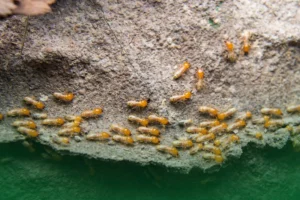
Termites are notorious for their ability to silently wreak havoc on homes and businesses. As temperatures rise, these wood-eating insects become more active, making it essential to be on the lookout for signs of infestation. Keep an eye out for winged termites, mud tubes, and tunnels in wood, and contact a pest control professional if you suspect you have a problem.
Book our Termite Control.
Summer Pests: Bed Bugs (Night time Nuisances)
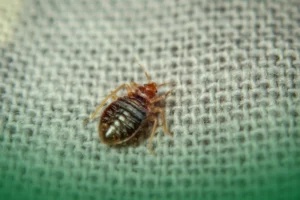
Bed bugs are another unwelcome addition to the list of most common summer pests. These tiny, blood-sucking insects can quickly infest mattresses, bedding, and furniture, causing itchy bites and sleepless nights. To prevent bed bug infestations, inspect hotel rooms and other accommodations before settling in, and regularly wash and dry bedding at high temperatures. If you suspect you have an infestation, contact a pest control professional immediately to address the problem.
Book our Bed Bug Control.
Conclusion
While a summer brings many joys, it also brings its fair share of summer pests. Termites are notorious for their ability to silently wreak havoc on homes and businesses. By taking proactive measures to prevent infestations and address any issues promptly, you can enjoy a pest-free summer season. Remember, when it comes to pest control, it’s always best to enlist the help of a professional who can develop a comprehensive treatment plan tailored to your specific needs. With their expertise and guidance, you can keep your home pest-free and enjoy all that summer has to offer.
Frequently Asked Questions
1. How can I prevent mosquitoes or other flying insects from invading my home during the summer months?
During the summer, mosquitoes can be a persistent nuisance, both indoors and outdoors. To prevent them from entering your home, make sure all windows and doors are properly screened to keep them out. Additionally, eliminate standing water around your property, as mosquitoes breed in stagnant water. Use insect repellents containing DEET or picaridin when spending time outdoors, and wear long sleeves and pants to minimize exposure to mosquito bites.
2. What steps can I take to protect my home from termite infestations during the summer?
Termite infestations can cause extensive damage to your home’s structure if left unchecked. To protect your property from termites during the summer, inspect your home regularly for signs of termite activity, such as mud tubes or tunnels in wood. Keep woodpiles, mulch, and debris away from your home’s foundation, as these can attract termites. Consider investing in termite prevention treatments, such as soil treatments or bait systems, to deter termites from infesting your property.
3. How can I identify a bed bug infestation in my home?
Bed bugs are small, reddish-brown insects that feed on blood and are commonly found in mattresses, bedding, and furniture. Signs of a bed bug infestation include itchy bites on the skin, bloodstains on bedding or furniture, and small dark spots (bed bug excrement) on sheets or mattresses. You may also notice a sweet, musty odor in rooms where bed bugs are present. If you suspect you have an infestation, contact a pest control professional for an inspection and treatment.
4. What are some effective methods for controlling ants in my home during the summer?
Ants can be a common problem during the summer months, as they forage for food indoors and outdoors. To control ants in your home, start by sealing off entry points, such as cracks and crevices in walls or around windows and doors. Keep food stored in tightly sealed containers, and clean up spills and crumbs promptly to eliminate food sources for ants. Consider using ant baits or non-toxic ant deterrents to discourage ants from entering your home.
